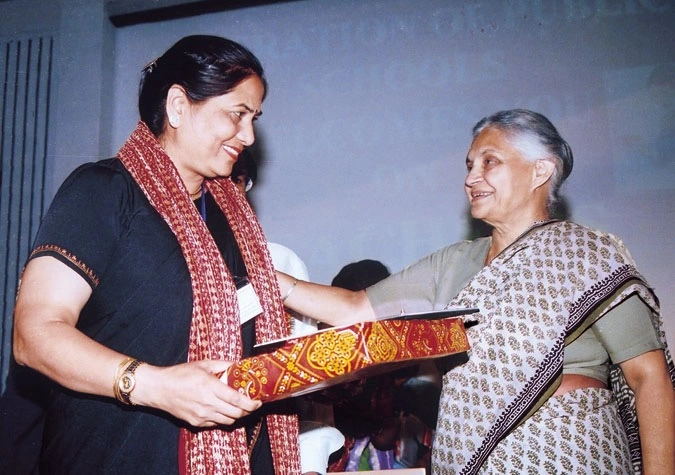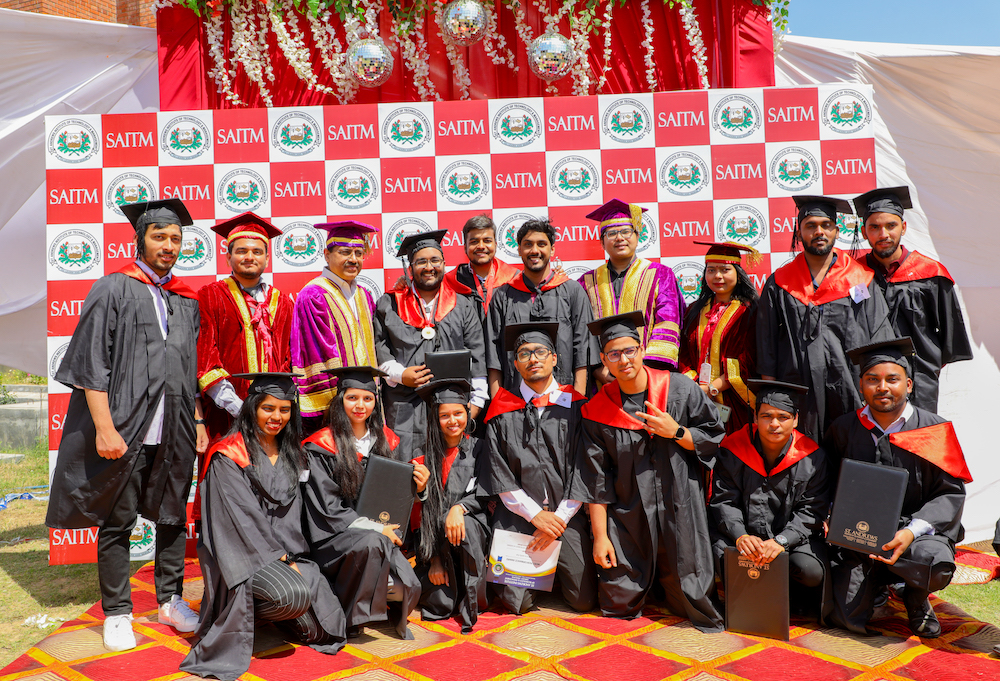Top BBA Entrance Exams in India

Image-1 BBA Campus Building at SAITM Gurgaon
In India, the Bachelor of Business Administration (BBA) stands as a sought-after undergraduate choice for those aiming to venture into management and business administration, typically preceded by clearing a BBA Entrance Exam.
Across the country, entrance exams for admissions into BBA courses are conducted by several universities and institutes.
Here’s an overview of some of the top BBA entrance exams in India:
IPU CET BBA (Indraprastha University Common Entrance Test):
Conducted by Guru Gobind Singh Indraprastha University (GGSIPU) for admissions into various BBA courses offered by colleges affiliated with the university.
The examination comprises inquiries spanning English Language & Comprehension, General Awareness, Logical and Analytical Ability, as well as Aptitude pertinent to the realms of management and communication skills.
DU JAT (Delhi University Joint Admission Test):
Conducted by Delhi University for admissions into various undergraduate programs including BBA (FIA), BMS, and B.A. (Hons) Business Economics offered by colleges affiliated with the university.
The examination encompasses segments covering Quantitative Ability, Reasoning and Analytical Ability, General English, and Business and General Awareness.
UGAT (Under Graduate Aptitude Test):
Conducted by All India Management Association (AIMA) for admissions into various undergraduate programs including BBA offered by participating institutes across India.
The test evaluates a candidate’s ability in English Language, Numerical and Data Analysis, Reasoning and General Intelligence, and General Knowledge.
NPAT BBA (NMIMS Programs After Twelfth – Bachelor of Business Administration):
Conducted by Narsee Monjee Institute of Management Studies (NMIMS) for admissions into BBA programs offered by NMIMS Mumbai, Bengaluru, Navi Mumbai, and Indore campuses.
The exam assesses a candidate’s proficiency in Quantitative & Numerical Ability, Reasoning & General Intelligence, and Proficiency in the English Language.
AIMA UGAT (All India Management Association Undergraduate Aptitude Test):
Conducted by AIMA for admissions into various undergraduate programs including BBA offered by participating institutes.
The exam evaluates a candidate’s skills in English Language, Numerical and Data Analysis, Reasoning and General Intelligence, and General Knowledge.
Some of the most opted courses in India and St. Andrews college or different Engineering college or Management colleges are as follows:-
- Btech
- Btech CSE
- Btech ETCE
- MTech
- BCA
- BBA
- MBA
- MCA
- DPharma – St. Andrews College of Pharmacy
- BPharma – St. Andrews College of Pharmacy
- BArch – St. Andrews College of Architecture
BBA Entrance Exam Eligibility

The eligibility criteria for BBA entrance exams in India may vary slightly depending on the specific exam and the university/institution conducting it. However, there are some common eligibility requirements that candidates typically need to fulfill.
Here’s a general overview:
Educational Qualifications:
Candidates must have completed or be appearing in the final year of their 10+2 or equivalent examination from a recognized board or institution.
The minimum percentage required in the qualifying examination may vary from institute to institute and exam to exam. Generally, a requirement is set for candidates to have achieved at least 50% to 60% aggregate marks in their 10+2 exams.
Age Limit:
There is usually no specific age limit for BBA entrance exams. However, candidates should check the age criteria specified by the respective conducting authorities or institutions.
Nationality:
Candidates must be Indian citizens. Some exams may also allow eligible foreign nationals to apply.
Other Requirements
Candidates may be required to fulfill other specific criteria as specified by the respective exam conducting authorities.
These may include domicile requirements, reservation criteria for certain categories (such as SC/ST/OBC/EWS), and any additional eligibility conditions.
BBA Entrance Exam Centres

Examination centres for BBA entrance exams in India are typically made available across various cities to accommodate candidates from different regions.
The specific examination centres for each BBA entrance exam may vary depending on the organizing body and the number of applicants from different regions.
However, below is provided a general idea of the organization of examination centres:
Metropolitan Cities:
Major metropolitan cities such as Delhi, Mumbai, Kolkata, Chennai, Bengaluru, Hyderabad, Pune, etc., often serve as examination centres for BBA entrance exams.
These cities have a high concentration of educational institutions and a large number of candidates appearing for these exams.
State Capitals:
State capitals and other prominent cities within each state are also commonly chosen to serve as centres for examinations. This ensures accessibility for candidates from different parts of the state.
Tier-II and Tier-III Cities:
To ensure equal opportunities for candidates from smaller cities and towns, examination centres are also set up in tier-II and tier-III cities across the country. These centres may be located in cities like Jaipur, Lucknow, Chandigarh, Bhopal, Ahmedabad, Kochi, etc.
Online Examination:
In some cases, BBA entrance exams may also be conducted in online mode, allowing candidates to choose their preferred exam centre from a list of options provided by the organizing body. In such cases, candidates can select a centre that is convenient for them.
International Centers:
For exams conducted by universities or institutes with a global presence, examination centres may also be set up in international locations to accommodate candidates residing abroad.
What Is The BBA Course Duration?

In India, the duration of BBA course is typically 3 years, spread across 6 semesters. This is the standard structure for full-time BBA programs in most Indian universities and colleges.
The BBA course is designed to provide students with a comprehensive understanding of various aspects of business administration, management principles, and related subjects.
During the three-year duration of the BBA course, students undergo a structured curriculum that covers a wide range of subjects including:
- Fundamentals of Business Management
- Accounting and Finance
- Marketing
- HRM
- Operations Management
- Organizational Behavior
- Business Law and Ethics
- Entrepreneurship
- Information Technology in Business
- Strategic Management
- Economics
Merit List for BBA Admission

For admission into BBA programs in India, merit lists are typically prepared based on the candidates’ performance in the respective entrance exams, and may be supplemented by other factors such as academic records, interviews, and group discussions, etc.
Here’s how the merit list preparation process generally works:
Entrance Exam Scores:
The preparation of the merit list is primarily based on the scores that have been obtained by candidates in the BBA entrance exams in which they have appeared. The performance of each candidate in the exam is evaluated, and they are ranked based on their scores relative to other applicants.
Normalization Process (if applicable):
In cases where an entrance exam is conducted in multiple sessions or shifts, a normalization process may be employed to ensure that fairness is maintained in comparing scores across different sessions.
This process adjusts scores to account for differences in difficulty levels among various exam sessions.
Cutoff Marks:
Institutes and universities often set cutoff marks based on the total number of seats available and the overall performance of candidates in the entrance exam.
Candidates who score above the cutoff are eligible for consideration in the merit list.
Additional Criteria:
- Some institutions may consider additional criteria alongside entrance exam scores, such as academic performance in 10+2 examinations, extracurricular achievements, work experience, etc. These factors may be used to break ties between candidates with similar entrance exam scores by institutes.
Merit List Publication:
Once the scores are normalized (if applicable) and other criteria are taken into account, the merit list is prepared by institutes.
It contains the names of candidates along with their ranks or scores.
Counseling/Admission Process:
Counseling sessions or admission interviews are the basis on which candidates are invited, depending on their ranks in the merit list, where the offer of admission into the BBA course may be made to them based on their preferences and the availability of seats.
BBA Entrance Exam Syllabus

The bba entrance exam syllabus in India can differ slightly based on the particular exam and its conducting authority.
However, bba entrance exams typically include a syllabus covering key topics across various subjects to evaluate candidates’ aptitude for business administration and management.
Here’s a broad overview of the typical syllabus for BBA entrance exams:
Quantitative Aptitude:
Arithmetic: Percentage, Profit and Loss, Ratio and Proportion, Time and Work, Time, Speed and Distance, etc.
Algebra: Basic Algebraic Identities, Linear Equations, Quadratic Equations, etc.
Geometry: Basic Concepts of Geometry, Mensuration, Triangles, Circles, etc.
Trigonometry: Trigonometric Ratios, Heights and Distances, etc.
Verbal Ability:
English Grammar: Parts of Speech, Sentence Correction, Error Spotting, Sentence Completion, etc.
Vocabulary: Synonyms, Antonyms, Analogies, Word Usage, etc.
Reading Comprehension: Passage-based questions to test understanding, inference, and vocabulary.
Logical Reasoning:
- Analogies
- Series Completion
- Coding-Decoding
- Blood Relations
- Direction Sense Test
- Syllogisms
- Seating Arrangement
- Puzzles
- Data Sufficiency
General Awareness:
Current Affairs: National and International events, Politics, Economy, Sports, Awards, etc.
Business and Economics: Basic concepts of Economics, Business Organizations, Famous Personalities in Business, Economic Policies, etc.
History, Geography, and General Science: Significant Events, Places, Discoveries, etc.
Data Interpretation:
- Tables
- Bar Graphs
- Pie Charts
- Line Graphs
- Caselets
- Data Sufficiency
Business and Management Aptitude:
Basics of Management: Functions of Management, Management Principles, Managerial Skills, etc.
Marketing: Marketing Mix, Branding, Market Segmentation, Advertising, etc.
Economics: Microeconomics and Macroeconomics Concepts, Demand and Supply, Market Structures, etc.
Finance: Basic Financial Concepts, Financial Markets, Financial Statements, etc.
Human Resource Management: Recruitment and Selection, Training and Development, Performance Appraisal, etc.
Business Ethics and Corporate Governance
Overview of IPM Aptitude Test (IPMAT)

The Integrated Program in Management (IPM) entrance examination, known as the IPMAT, is administered by the Indian Institute of Management (IIM) Indore for admission to its program.
The IPM is a five-year integrated program that combines undergraduate and postgraduate studies in management. Here’s an overview of the IPMAT:
Exam Pattern
The IPMAT consists of two sections: Quantitative Ability (QA) and Verbal Ability (VA).
The duration of the exam is 2 hours.
The exam is conducted in online computer-based mode.
Sections and Syllabus
Quantitative Ability (QA): This section assesses candidates’ proficiency in mathematical concepts and numerical reasoning.
- Topics include Arithmetic, Algebra, Geometry, Mensuration, Modern Mathematics, and Data Interpretation.
Verbal Ability (VA): This section evaluates candidates’ language comprehension and verbal reasoning skills.
- Topics include Reading Comprehension, Grammar, Vocabulary, Para Jumbles, and Sentence Completion.
Marking Scheme:
Each question in the IPMAT carries equal marks.
There is a negative marking scheme for incorrect answers. For each incorrect response, one mark is deducted.
Unattempted questions do not carry any penalty.
Eligibility
Candidates must have completed or be appearing in their 10+2 examination from a recognized board or institution.
General and NC-OBC category candidates must have scored at least 60% aggregate marks in the 10+2 examination. The minimum aggregate marks requirement is relaxed to 55% for SC, ST, and PwD category candidates.
Selection Process:
The selection process for admission to the IPM program consists of two stages:
- IPMAT: Shortlisting of candidates is based on their performance in the IPMAT.
- Written Ability Test (WAT) and Personal Interview (PI): Shortlisted candidates are invited to participate in the WAT and PI rounds conducted by IIM Indore.
Preparation Tips:
Understand the exam pattern and syllabus thoroughly.
Practice solving a variety of questions from each section to improve speed and accuracy.
Solve previous years’ question papers and take mock tests to assess your preparation level.
Work on time management skills to ensure effective utilization of the allotted exam duration.
The IPMAT is a highly competitive exam, and aspirants should prepare diligently to secure admission to the prestigious Integrated Program in Management offered by IIM Indore.
Overview of AIMA UGAT

AIMA UGAT (Under Graduate Aptitude Test) is a national-level entrance exam conducted by the All India Management Association (AIMA) for admission to various undergraduate programs such as BBA, BCA, BHM, etc., offered by participating institutes across India. Here’s an overview of the AIMA UGAT exam:
Exam Pattern:
The AIMA UGAT exam can be conducted in both offline (paper-based) and online (computer-based) modes.
The exam consists of multiple-choice questions (MCQs) divided into different sections based on the course selected by the candidate.
The duration of the exam is usually 2 hours.
Sections and Syllabus:
The exam pattern and syllabus may vary slightly depending on the course selected by the candidate. However, common sections include:
English Language: Vocabulary, Grammar, Reading Comprehension, etc.
Numerical and Data Analysis: Arithmetic, Algebra, Geometry, Data Interpretation, etc.
Reasoning and General Intelligence: Verbal and Non-verbal Reasoning, Logical Reasoning, Analytical Ability, etc.
General Knowledge: Current Affairs, General Awareness, Business and Economics, Scientific Developments, etc.
Marking Scheme
Usually, one mark is typically awarded for each correct answer.
There may be negative marking for incorrect answers, with 0.25 or 0.5 marks deducted for each wrong response, depending on the exam.
Eligibility:
The eligibility criteria for AIMA UGAT may vary slightly depending on the course and the institute/college.
Nevertheless, candidates typically require completion of or enrollment in their 10+2 examination from a recognized board or institution.
Selection Process
After the AIMA UGAT exam, participating institutes release their respective cutoff scores.
Candidates meeting the cutoff criteria are invited for further rounds of selection, which may include group discussions (GD) and personal interviews (PI).
Final admissions are based on the overall performance of candidates in the entrance exam, GD, PI, and other criteria specified by the participating institutes.
Preparation Tips:-
Understand the exam pattern and syllabus thoroughly.
Practicing solving previous years’ question papers and sample papers is recommended to get acquainted with the exam format and types of questions.
Improve time management skills to ensure effective utilization of the exam duration.
Stay updated with current affairs and general knowledge topics.
IPMAT

The Integrated Program in Management Aptitude Test (IPMAT) is an entrance examination organized by the Indian Institute of Management (IIM) Indore. It serves as the gateway to the esteemed five-year Integrated Program in Management (IPM). Here is a concise overview of the IPMAT.
Exam Pattern:-
The IPMAT is typically conducted in a computer-based mode.
The exam consists of two sections: Quantitative Ability (QA) and Verbal Ability (VA).
The duration of the exam is 2 hours.
Sections and Syllabus:-
1. Quantitative Ability (QA):
Arithmetic: Percentage, Profit and Loss, Time and Work, Time, Speed and Distance, etc.
Algebra: Basic Algebraic Identities, Linear Equations, Quadratic Equations, etc.
Geometry: Basic Concepts of Geometry, Mensuration, Triangles, Circles, etc.
Data Interpretation: Tables, Bar Graphs, Pie Charts, Line Graphs, Caselets, Data Sufficiency.
2.Verbal Ability (VA):
Reading Comprehension: Passages with questions to test comprehension, vocabulary, and inference.
English Grammar: Sentence Correction, Error Spotting, Para Jumbles, Sentence Completion, etc.
Vocabulary: Synonyms, Antonyms, Analogies, Word Usage, etc.
Marking Scheme:-
Each question carries equal marks.
There is a penalty for wrong answers. For each incorrect response, one mark is deducted.
Unattempted questions do not carry any penalty.
Eligibility:-
Candidates must have completed or be appearing in their 10+2 examination from a recognized board or institution.
General and NC-OBC category candidates must have scored at least 60% aggregate marks in the 10+2 examination. The minimum aggregate marks requirement is relaxed to 55% for SC, ST, and PwD category candidates.
Selection Process:-
The selection process for admission to the IPM program at IIM Indore consists of two stages:
- IPMAT: Shortlisting of candidates is based on their performance in the IPMAT.
- Written Ability Test (WAT) and Personal Interview (PI): Shortlisted candidates are invited to participate in the WAT and PI rounds conducted by IIM Indore.
Preparation Tips–
Understand the exam pattern and syllabus thoroughly.
Practice solving a variety of questions from each section to improve speed and accuracy.
Solve previous years’ question papers and take mock tests to assess your preparation level.
Work on time management skills to ensure effective utilization of the allotted exam duration.
BBA Entrance Exam through CUET

The CUET is introduced as a BBA entrance exam, and a structure similar to other common entrance tests in India might be followed. Here’s how the BBA entrance exam through CUET might look:
Exam Pattern;
CUET may consist of multiple-choice questions (MCQs) covering various subjects relevant to BBA programs.
The exam duration could be around 2 to 3 hours.
Sections and Syllabus;
Quantitative Aptitude: Arithmetic, Algebra, Geometry, Data Interpretation, etc.
Verbal Ability: Reading Comprehension, Grammar, Vocabulary, Sentence Correction, etc.
Logical Reasoning: Analogies, Series Completion, Coding-Decoding, Blood Relations, etc.
General Awareness: Current Affairs, Business and Economics, General Knowledge, etc.
Marking Scheme;
A certain number of marks may be awarded for each correct answer.
There might be negative marking for incorrect answers.
Eligibility–
Candidates must have completed or be appearing in their 10+2 examination from a recognized board or institution.
The minimum aggregate marks required in the 10+2 examination may be specified.
Selection Process;
After the CUET exam, participating universities may release their respective cutoff scores.
Further rounds such as group discussions (GD) and personal interviews (PI) may be called for by shortlisted candidates.
Final admissions would be based on the overall performance of candidates in CUET, GD, PI, and possibly other criteria specified by the participating universities.
Preparation Tips;
Understand the exam pattern and syllabus thoroughly.
Practice solving questions from each section regularly to improve proficiency.
Utilize study materials and resources specifically designed for BBA entrance exams.
Stay updated with current affairs and general knowledge topics.
IPU CET

The Indraprastha University Common Entrance Test (IPU CET), administered by Guru Gobind Singh Indraprastha University (GGSIPU), or IPU, serves as an entrance examination for BBA programs and other undergraduate and postgraduate programs offered by affiliated colleges of the university.
Exam Pattern_
The BBA entrance exam for IPU CET typically features multiple-choice questions (MCQs).
The entrance exam duration is usually around 2 to 2.5 hours.
The questions are divided into sections that cover various subjects relevant to business administration and management.
Sections and Syllabus–
English Language & Comprehension: Vocabulary, Grammar, Reading Comprehension, Sentence Correction, etc.
General Awareness: Current Affairs, Business and Economics, General Knowledge, etc.
Logical and Analytical Ability: Analogies, Series Completion, Coding-Decoding, Blood Relations, Syllogisms, etc.
Aptitude related to the field of Management and Communication Skills: Basic Management Concepts, Business Environment, Communication Skills, etc.
Marking Scheme–
Usually, one mark is typically awarded for each correct answer.
There may be negative marking for incorrect answers. Typically, a deduction of 0.25 or 0.33 marks is made for each wrong response.
Eligibility;
Candidates must have completed or be appearing in their 10+2 examination from a recognized board or institution.
The minimum aggregate marks required in the 10+2 examination may be specified.
Selection Process–
After conducting the BBA entrance exam, IPU CET, the university announces cutoff scores.
Shortlisted candidates may be called for counseling sessions or further rounds, such as group discussions (GD) and personal interviews (PI).
Final admissions are based on the overall performance of candidates in the IPU CET BBA exam, GD, PI, and possibly other criteria specified by the university.
Preparation Tips-:
Understand the BBA entrance exam pattern and syllabus thoroughly.
Practice solving questions from each section regularly to improve proficiency.
Utilize study materials and resources specifically designed for BBA entrance exams.
Stay updated with current affairs and general knowledge topics.
Eligibility Criteria For BBA Course In India

The eligibility criteria for pursuing a BBA course in India may vary slightly depending on the university or institute offering the program.
However, here’s a general overview of the common eligibility criteria:
Academic Qualifications:
Candidates must have completed their 10+2 or equivalent examination from a recognized board or institution.
The qualifying examination should be in any stream (Science, Commerce, or Humanities).
Minimum Percentage Requirement:
While the specific minimum percentage required may vary from institute to institute, a minimum aggregate score ranging from 50% to 60% in their 10+2 examination is typically required by candidates.
Some institutes may have a relaxation in the minimum percentage requirement for candidates belonging to reserved categories such as SC, ST, OBC, or PwD.
Age Limit:-
There is usually no specific age limit for admission to BBA courses. However, candidates should check the age criteria specified by the respective institutes or universities.
Entrance Exams:
For admission to their BBA programs, some universities and institutes may require candidates to qualify in BBA entrance exams. These exams are a prerequisite for eligibility.
However, many institutes also offer admission based on merit in the qualifying examination (10+2).
English Language Proficiency:
Admission to BBA programs often requires proficiency in the English language. Institutes may assess candidates’ English language skills through entrance exams, interviews, or written tests.
Other Requirements:
Additional criteria specified by the respective institutes or universities, such as domicile requirements, submission of relevant documents, etc., may be required to be fulfilled by candidates.
What Are The Career Opportunities After a BBA Degree in India?

A BBA degree equips students with practical knowledge, opening doors to diverse career opportunities across various sectors in India.
Here are some common career paths that are followed by individuals with a BBA degree:
Management Trainee/Executive
Many companies hire BBA graduates as management trainees or executives. These roles typically involve working in different departments to gain exposure to various functions of the organization.
Sales and Marketing
Individuals with a BBA degree frequently secure roles in sales and marketing. Positions such as sales executives, marketing coordinators, brand managers, or digital marketing specialists are common, spanning industries from FMCG (Fast Moving Consumer Goods) to IT.
Finance and Banking
After completing BBA, individuals can explore career opportunities in the finance and banking sectors. Positions such as financial analysts, investment bankers, financial planners, or bank officers may be available to them.
Human Resources (HR)
HR departments in companies recruit BBA graduates for roles such as HR executives, recruiters, talent acquisition specialists, or training coordinators.
Operations Management
BBA graduates can work in operations management roles where they are responsible for streamlining processes, optimizing efficiency, and ensuring smooth business operations.
Consulting
Consulting firms often hire BBA graduates to provide business advisory services to clients. These roles may involve analyzing data, conducting market research, and developing strategies to improve business performance.
Entrepreneurship

Graduates holding a BBA degree can utilize their academic achievements to pursue entrepreneurial endeavors. The knowledge and abilities developed during their education are crucial for starting and guiding a business to success.
Supply Chain Management
BBA degree holders can work in supply chain and logistics roles, where they manage the flow of goods and services from suppliers to customers. This may involve inventory management, transportation, and warehouse operations.
Information Technology (IT) Management
With the increasing integration of technology in businesses, BBA graduates can explore opportunities in IT management roles where they oversee the implementation and management of IT systems to support business objectives.
International Business

BBA graduates interested in global markets can pursue careers in international business. They may work for multinational corporations, export-import firms, or international trade organizations, handling activities such as market research, export documentation, and global expansion strategies.
BBA Admission Process in India

The admission process for a Bachelor of Business Administration (BBA) program in India typically varies from one institution to another, but there are some common elements across most universities and colleges.
Here’s a general overview of the BBA admission process in India:
Eligibility Criteria
Candidates must meet the BBA eligibility criteria set by the respective university or college. Generally, applicants must have completed their 10+2 or equivalent examination from a recognized board with a minimum aggregate score (usually ranging from 50% to 60%).
Some institutions may also have specific subject requirements such as Mathematics, Economics, or Commerce.
Entrance Examinations
Many universities and colleges conduct entrance examinations for admission to their BBA programs. Some of the popular BBA entrance exams in India include:
- DU JAT (Delhi University Joint Admission Test)
- IPMAT (Integrated Program in Management Aptitude Test)
- NPAT (NMIMS Programs After Twelfth)
- UGAT (Under Graduate Aptitude Test) conducted by AIMA (All India Management Association)
Application Process
Candidates interested in pursuing a BBA course need to fill out the application forms for the institutions they wish to apply to. The application forms are usually available online on the official websites of the respective universities or colleges.
Personal details, academic qualifications, and other relevant information are required to be provided by applicants as part of the application process.
Entrance Exam Preparation
Candidates aiming for institutions that require BBA entrance exams must prepare thoroughly for these examinations.
This process includes delving into subjects like Numerical Ability, Logical Reasoning, English Language, and General Awareness. Numerous candidates prefer enrolling in coaching classes or engaging in self-study through preparation books and online materials.
Admission Test and Selection Process
After applying and appearing for the entrance examination (if applicable), candidates are shortlisted based on their performance in the entrance test and/or their 10+2 examination results.
Shortlisted candidates are then called for further rounds of selection, which may include GD and personal interviews (PI).
Merit List and Final Admission
Admission to the BBA course is granted to candidates included in the final merit list, which is prepared by the respective institutions. This preparation is based on the candidates’ performance in the entrance exam, group discussions (GD), personal interviews (PI), and their academic qualifications.
Document Verification and Fee Payment
Upon the receipt of the admission offer, the verification of documents such as mark sheets, certificates, and other relevant documents is required to be done by the candidates.
After document verification, candidates need to pay the admission fee within the stipulated time to confirm their seat in the BBA course.
BBA Course Syllabus and BBA Subjects in India

The syllabus and subjects covered in a Bachelor of Business Administration (BBA) program in India may vary slightly from one university to another.
The BBA curriculum commonly encompasses fundamental subjects and topics that are integral to most programs.
Here’s a general overview of the BBA course syllabus and BBA subjects commonly taught in India:
Foundation Courses:
- Business Mathematics
- Business Economics
- Financial Accounting
- Business Communication
- Principles of Management
- Business Statistics
Core Business Subjects:
- Marketing Management
- Financial Management
- HRM
- Operations Management
- Organizational Behavior
- Business Law
- Entrepreneurship Development
- Business Ethics and Corporate Governance
- Strategic Management
Specialization Electives (Optional, depending on the university):
Marketing Specialization: Consumer Behavior, Advertising and Sales Promotion, Brand Management, Market Research.
Finance Specialization: Financial Markets and Institutions, Investment Management, Financial Statement Analysis, Risk Management.
Human Resource Management Specialization: Training and Development, Performance Management, Compensation Management, Industrial Relations.
Operations Management Specialization: Supply Chain Management, Quality Management, Production and Operations Planning, Logistics Management.
Information Technology Specialization: Management Information Systems (MIS), E-Business, IT Project Management, Database Management Systems.
International Business Specialization: International Marketing, International Finance, Global Business Environment, Export-Import Management.
Interdisciplinary Subjects:
- Business Environment
- Business Research Methods
- Managerial Economics
- Business Strategy
Soft Skills Development:
- Business Communication Skills
- Presentation Skills
- Leadership Skills
- Teamwork and Collaboration
- Negotiation Skills
Internship/Project Work
Many BBA programs require students to undergo an internship or complete a project in a real business environment to gain practical exposure and apply theoretical knowledge to real-world situations.
General Education Courses
Some universities may include general education courses such as English, Environmental Studies, and Indian Constitution as part of the curriculum.
Capstone Project/Thesis

In certain BBA programs, completion of a capstone project or thesis in the final year might be required by students, entailing research on a specific business-related topic under faculty guidance.
FAQs About Bachelor of Business Administration (BBA)
What exams to give after 12th for BBA?
Students aiming to pursue a Bachelor of Business Administration (BBA) after the 12th grade have a variety of BBA entrance exams to consider in India.
Key exams include the DU JAT, conducted by Delhi University for admission into its BBA programs; the IPMAT, for integrated BBA+MBA programs at IIM Indore and Rohtak; NPAT for Narsee Monjee Institute of Management Studies; and the UGAT, a comprehensive test conducted by the All India Management Association.
Distinct BBA entrance exams assess various skills such as quantitative aptitude, logical reasoning, general English, and business awareness, meeting admission criteria of renowned BBA colleges and universities.
Is cat necessary for BBA?
No, the Common Admission Test (CAT) is not necessary for BBA admissions. CAT is primarily for those seeking admission into postgraduate management programs like the MBA.
Gaining entry into BBA programs generally involves clearing specific undergraduate entrance tests tailored for BBA courses, like the DU JAT, NPAT, or SET.
Is CUET compulsory for BBA?
The Common University Entrance Test (CUET) has become increasingly significant for undergraduate admissions in India, including for BBA programs at certain universities.
While not universally mandatory across all institutions offering BBA, many universities now require CUET scores for admission. It’s essential to check the specific requirements of each institution to determine if CUET is compulsory for their BBA course.
Is BBA entrance exam tough?
The difficulty level of BBA entrance exams varies, depending on the specific exam and the candidate’s preparation. While some students find the exams challenging, particularly the sections on quantitative aptitude and logical reasoning, thorough preparation can significantly ease the difficulty and increase the chances of scoring well.
What is eligibility for BBA?
The eligibility criteria for BBA programs typically include completing 10+2 or equivalent from a recognized board with a minimum aggregate percentage, which varies across institutions (usually around 50-60%). Some colleges may also specify eligibility criteria related to specific subjects or require scores from entrance exams dedicated to BBA admissions.
Can I do BBA without maths?
Yes, you can pursue a BBA without having studied mathematics in your 12th grade. Many colleges and universities do not mandate mathematics as a compulsory subject for admission into their BBA programs.
However, having a basic understanding of maths might be beneficial for managing the quantitative aspects of the business curriculum.
Does 12th marks matter for BBA?
Yes, 12th-grade marks matter for BBA admissions as most colleges and universities set a minimum aggregate percentage as eligibility criteria, typically around 50-60%.
However, the emphasis on 12th-grade marks varies across institutions, with some giving more weight to entrance exam scores or other selection criteria.
Can I do BBA with 45 percentage?
Yes, you can pursue a BBA with a 45% score in the 12th grade. Specifically, you can take admission in St. Andrews Institute of Technology and Management with 45% of marks.
This institution is among those that offer flexibility in their admission criteria, providing opportunities for students with lower percentages to pursue a business administration degree.





